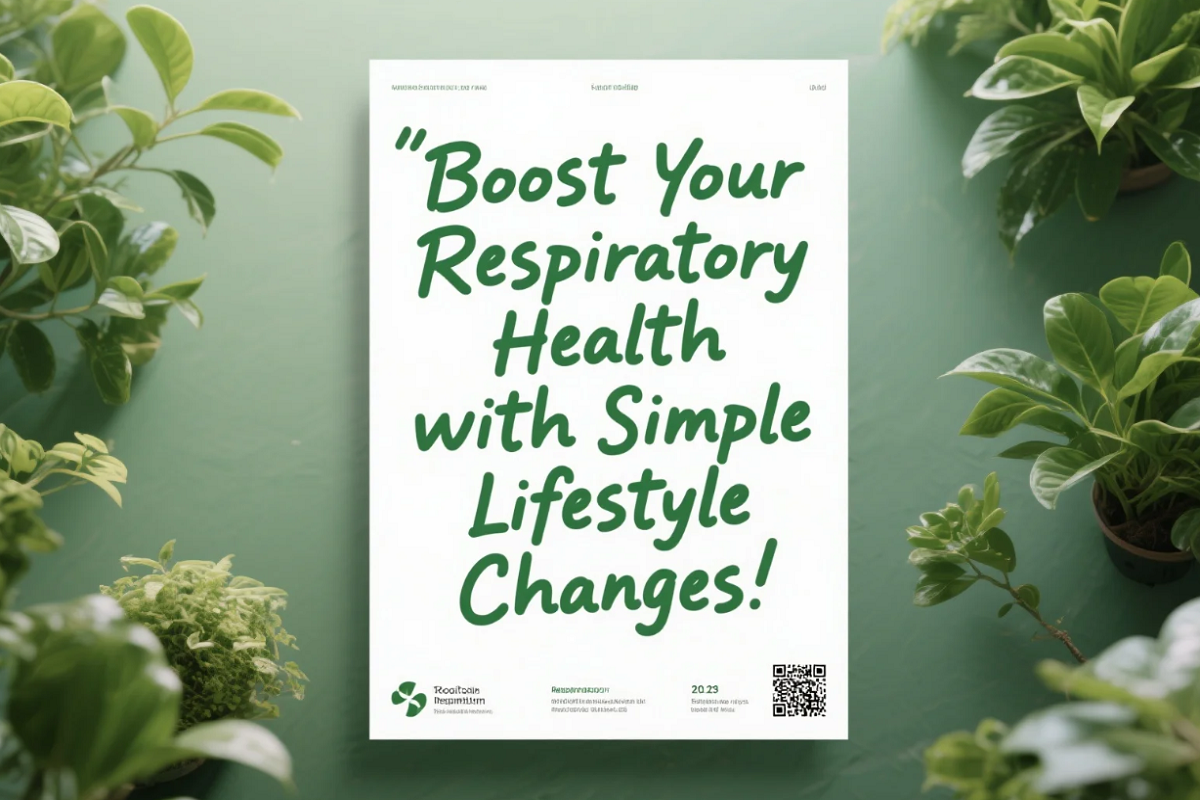Boost Your Respiratory Health with Simple Lifestyle Changes
-
23
- 27 Oct, 2025

Are you finding it hard to catch your breath during daily activities? Do you often feel tired, congested, or struggle with allergies or asthma? You're not alone. With pollution levels rising, and sedentary lifestyles becoming more common, respiratory health is more important than ever. But here's the good news — improving your breathing doesn’t require expensive treatments or complex routines. You can boost your respiratory health with simple, practical changes in your daily life.
This article will guide you through easy and effective lifestyle habits that can make a dramatic difference in how well your lungs function. Whether you’re looking to breathe easier, increase your energy levels, or support your long-term wellness, these tips will help you get there — naturally.
Why Respiratory Health Matters
Your lungs are vital organs that provide oxygen to every cell in your body. Without enough oxygen, your body can’t perform at its best. Healthy lungs mean:
- Better physical endurance
- Improved immunity
- More restful sleep
- Enhanced brain function
- Lower risk of chronic conditions
In contrast, poor lung function can lead to fatigue, frequent infections, and even life-threatening illnesses.
What This Article Will Cover
We’ll walk you through the top natural ways to improve lung function, including:
- Diet and hydration
- Breathing exercises
- Physical activity
- Environmental changes
- Habits to avoid
By the end, you’ll have a practical plan to breathe easier and live healthier — all by adopting a few manageable lifestyle habits.
10 Simple Lifestyle Changes to Boost Your Respiratory Health
1. Practice Deep Breathing Every Day
One of the easiest ways to improve your lung capacity is by engaging in deep breathing exercises. Shallow breathing, common during stress or sedentary habits, limits oxygen intake. Instead, try:
- Diaphragmatic breathing: Focus on expanding your belly, not just your chest.
- Try box breathing: Breathe in for 4 seconds, hold it for 4, exhale slowly for 4, then pause for another 4—repeat to reset your rhythm.
- Do this for 5–10 minutes daily.
This increases oxygen levels, relaxes your nervous system, and strengthens respiratory muscles.
2. Eat a Lung-Friendly Diet
Your diet plays a major role in lung health. Nutrient-rich foods can reduce inflammation, boost immunity, and help detoxify your lungs.
Best Foods for Lung Function:
- Leafy greens (spinach, kale, collards)
- Citrus fruits (rich in vitamin C)
- Berries (loaded with antioxidants)
- Fatty fish (omega-3 fatty acids)
- Ginger and turmeric (anti-inflammatory)
Avoid processed foods, excessive dairy, and sugary drinks that can contribute to mucus production.
3. Stay Hydrated
Proper hydration keeps the mucosal lining in your lungs thin, which makes it easier to breathe and helps prevent infection. Aim for:
- 8–10 glasses of water per day
- Herbal teas like peppermint or licorice root
- Avoid excessive caffeine or alcohol
- Staying hydrated also helps flush out toxins from your respiratory system.
4. Exercise Regularly
Engaging in aerobic exercise improves your respiratory endurance and strengthens the muscles used for breathing.
Great Exercises for Lungs:
- Brisk walking
- Swimming
- Cycling
- Yoga or pilates (great for breath control)
- Dancing
Try at least 30 minutes of moderate activity five days a week.
5. Avoid Smoking and Secondhand Smoke
This one’s a no-brainer. Smoking damages your lungs, reduces lung capacity, and significantly increases your risk of COPD, cancer, and heart disease.
If you smoke, seek help to quit. Steer clear of spaces where secondhand smoke lingers—it’s harmful even if you’re not the one lighting up.
6. Improve Indoor Air Quality
Since most people spend a majority of their time indoors, air quality inside your home or office plays a huge role in your respiratory well-being.
Tips to Improve Indoor Air:
- Use HEPA air purifiers
- Keep windows open (when outdoor air is clean)
- Avoid harsh cleaning products
- Add indoor plants (like spider plant, peace lily)
Keep humidity in check to stop mold and dust mites from making themselves at home.
7. Avoid Environmental Pollutants
From car fumes to industrial chemicals, pollutants are everywhere. Try to:
- Protect your lungs—mask up when the air outside isn’t playing fair.
- Check the daily air quality index (AQI)
- Stay indoors on high-pollution days
- Avoid areas with heavy traffic
Consider switching to natural household products and reducing exposure to synthetic fragrances and aerosols.
8. Maintain a Healthy Weight
Carrying excess weight can compress your lungs and diaphragm, making breathing harder. Carrying excess weight can raise your chances of developing conditions like sleep apnea and asthma.
Pairing a balanced diet with consistent exercise can help you:
- Improve lung capacity
- Reduce breathlessness
- Enhance energy levels
Shedding even a small amount of weight can noticeably improve how well your lungs work.
9. Manage Stress and Anxiety
Stress causes shallow breathing and can trigger asthma attacks or panic breathing. Managing stress through:
- Meditation
- Journaling
- Therapy or support groups
- Nature walks
Can improve how you breathe and elevate your overall sense of well-being.
10. Get Regular Medical Checkups
Even if you feel healthy, routine lung checkups help detect problems early. If you have:
- A family history of respiratory illness
- Allergies or asthma
- Shortness of breath
- Chronic cough
Consult a doctor. Preventive care is a key part of long-term respiratory health.
Bonus Tips to Supercharge Your Lungs
Use Steam Therapy
Inhaling warm steam helps open airways and loosen mucus. Incorporate soothing essential oils like eucalyptus or peppermint for an extra dose of relief.
Practice Good Posture
Sitting hunched compresses your lungs. Practice standing tall and stretching your chest to allow full lung expansion.
Laugh More
Laughter is great exercise for your lungs. It helps expel stale air and allows fresh air in.
Final Thoughts
Breathing is the most basic, yet most essential function of life. By making small but consistent lifestyle changes, you can dramatically boost your respiratory health, improve your energy, and protect yourself from future illness.
These strategies don’t require expensive tools or intense commitment — just a little daily awareness. Your lungs are resilient and responsive. The more you care for them, the stronger and healthier they become.
Start small. Stay consistent. And breathe easier, every single day.










